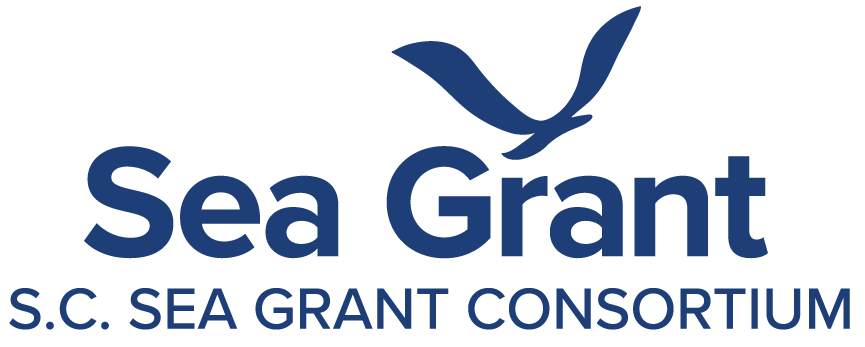![]()
Coastal Heritage Curriculum Connection
Explore Curriculum Connection guides, which are written to accompany each issue of Coastal Heritage, a quarterly publication of the S.C. Sea Grant Consortium.
Coastal Heritage, Spring 2016 issue: Career Jump-Start: Cultivating the Future Workforce
Focus Questions
- Why is it important to train people in marine-related careers?
- Name two national fellowship programs that are supported by Sea Grant.
- There are two individuals who worked specifically with the Eastern Oyster. How did their experience with Sea Grant influence their future work with oysters?
Use the Curriculum Connection to address these South Carolina Standards
K.S.1A.1 Ask and answer questions about the natural world using explorations, observations, or structured investigations.
3.S.1A.7 Construct scientific arguments to support claims, explanations, or designs using evidence from observations, data, or informational texts.
4.E.2B.3 Construct explanations about regional climate differences using data from the long-term weather conditions of the region.
6.E.2B.4 Construct explanations for how climate is determined in an area (including latitude, elevation, shape of the land, distance from water, global winds, and ocean currents).
8.S.1B.1 Construct devices or design solutions using scientific knowledge to solve specific problems or needs: (1) ask questions to identify problems or needs, (2) ask questions about the criteria and constraints of the device or solutions, (3) generate and communicate ideas for possible devices or solutions, (4) build and test devices or solutions, (5) determine if the devices or solutions solved the problem and refine the design if needed, and (6) communicate the results.
H.E.5A.8 Analyze scientific arguments regarding the nature of the relationship between human activities and climate change.
H.E.4A.7 Develop and use models to predict the effects of an environmental change (such as the changing life forms, tectonic change, or human activity) on global carbon cycling.
H.B.6B.1 Develop and use models of the carbon cycle, which include the interactions between photosynthesis, cellular respiration and other processes that release carbon dioxide, to evaluate the effects of increasing atmospheric carbon dioxide on natural and agricultural ecosystems.
H.E.6A.4 Analyze and interpret data of a local drainage basin to predict how changes caused by human activity and other factors influence the hydrology of the basin and amount of water available for use in the ecosystem.
H.E.6A.5 Analyze and interpret data to describe how the quality of the water in drainage basins is influenced by natural and human factors (such as land use, domestic and industrial waste, weather/climate conditions, topography of the river channel, pollution, or flooding).
Lesson Links
Carbon: The World Traveler
Carbon forms the backbone of life and also is integral in our weather and climate patterns. Understand how carbon cycles through the atmosphere, hydrosphere, and lithosphere with this carbon cycling activity: www.cosee-se.org/ForEducators/GlobalandSoutheastClimateChange/ (6th – 12th)
Build Your Own Weather Buoy!
By monitoring weather patterns and water quality parameters, scientists can identify trends related to a changing climate. Build your own water-quality buoy by accessing the Teacher Guide. (3rd – 12th).
Ode to an Oyster
Learn how oysters grow in clumps to form the oyster reefs found all along the southeastern coastline. Access the Estuaries 101 Lesson at estuaries.noaa.gov/Teachers/oysters.aspx . (6th – 8th)
Stewardship Opportunities
Beach Sweep/River Sweep
Be part of the largest state-wide clean-up in South Carolina! Beach Sweep/River Sweep is an annual litter cleanup co-organized by the S.C. Sea Grant Consortium and the S.C. Department of Natural Resources. The Sweep is held every 3rd Saturday in September. For more information will be posted on the website: www.scseagrant.org/bsrs. Participants will not only help their environment by collecting litter, but will provide valuable data on how much and what type of debris is being collected. (K-adult)
SCORE: South Carolina Oyster Restoration and Enhancement Program
Help do your part in restoring oyster reefs by volunteering during a SCORE event! Volunteers bag oyster shell and then construct reefs that form the foundation for live oysters to grow. Get your students or community involved today by visiting: score.dnr.sc.gov .
Additional Opportunities
Charleston STEM Festival
Don’t miss out on this free and incredible learning experience for all ages! Bring your students, family, or friends to the Charleston STEM Festival February 11, 2017 for hands-on learning, free giveaways and prizes, and exciting demonstrations that all focus on STEM (science-technology-engineering-math) disciplines! Check out the promotional video and learn more about this exciting event by visiting their website: charlestonstemfest.org . (K – adult)
